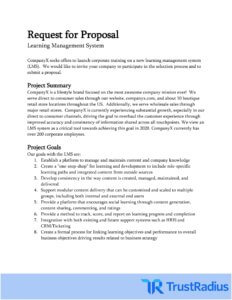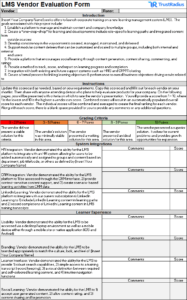Learning Management System Requirements for Corporate Training
If your organization needs a new learning management system, the first step is to get a handle on your requirements. This article provides three resources for corporate LMS buyers: a list of the top 5 requirements to consider, an example RFP to articulate requirements to vendors, and a scorecard template to compare how well requirements are met.
Top 5 must-have requirements for LMS
TrustRadius talked with experienced LMS buyers about their requirements, and put together this list. It includes direct commentary so that other LMS buyers can learn from how their peers in the field think about and solve problems. Here are the most important factors to consider when evaluating corporate learning management system in 2019:
#1 System integrations – from HRIS and CRM to communications and reporting, for example.
Why it’s important to buyers:
“In order to create a culture of learning, we had to look at the experience from a learner-first mentality. We want to make sure that learning isn’t something that requires the learner to access a totally independent system. It should look, feel, and interact as a seamless tool that links to benefit information, internal training, and external vendors (LinkedIn Learning, for example) without feeling like you’re accessing three separate systems.”
#2 Reporting
Why it’s important to buyers:
“Learners today aren’t limited to simply learning within one tool. In the old days, anything in the LMS could be tracked, reported on, and measured to an extent. Now, learners are taking the ‘just google it route’ when they run into an issue. Using that mentality, we need to have a platform in place that can track learning across all platforms. This is especially important for the LinkedIn Learning integration. Content consumed through that platform (either directly integrated or via some sort of interface) must be reported in one transcript as well as through the system of record for the organization.”
#3 Flexibility
Why it’s important to buyers:
“We have a wide range of audience types that we need to accommodate within the platform. We have admins, managers, HR, internal users, external users (call center and in-store staff), and customers that need to access and interact with content in a variety of ways. In order to accomplish what we needed, we need to have flexibility in how we structure content, organize information, and provide access based on user group. There are certain things that need to be behind passwords and other content that doesn’t. Being able to assign content in a way that allows people to have the right content when they need it, and in a minimal number of clicks, is very important.”
#4 Development
Why it’s important to buyers:
“Common development platforms tend to limit creativity and engagement possibilities. While it’s important to be able to accept traditionally developed content packages (SCORM), it’s also important for SMEs to be able to build content to help scale. Having a license for traditional tools can be costly and not well used by SMEs, so it’s important they have a way to build content in a templated format to drive consistency and ease the maintenance effort of the L&D team. Not only that, the types of engagements are vitally important. We can’t have one type of engagement source – not just text, not just video, not just PDFs or PPTs. We need to be able to vary the instruction in a way that keeps the learner interested as well as craving more knowledge. We don’t want learning to be something that HAS to happen, but rather something in which people WANT to participate. When a new product launches, we want them actively searching out content rather than being pushed to explore.”
#5 User Experience
Why it’s important to buyers:
“Adding on the point of having a learning culture driven to learn, the user experience has to be intuitive. Learners need to be able to quickly find and consume the right information in the right moment. It’s more of a need for ‘just in time’ type learning rather than formal learning experiences. Learning should be included in the every day workflow, not a separate activity.”
Example RFP for LMS
Most corporate LMS buyers compile their requirements into a request for proposal document, or RFP. RFPs are sent with the expectation that LMS vendors will throw their hats into the ring to compete for selection. One goal of the RFP is generating competition among vendors, to negotiate favorable terms. Another goal is to clearly lay out your requirements for LMS vendors. In return, you’ll get a written summary of how their products and services do or do not meet those requirements.
Writing an RFP for your LMS project may feel daunting. But it doesn’t have to be! Use this free example LMS RFP as a starting place.
Note: this RFP was created by a real buyer in our community to send to LMS vendors. All information about the buyer’s company and technology stack has been generalized. You’ll need to update the RFP to reflect the details of your own company and project.
LMS Vendor Scorecard Template
The next step is to schedule product demos with vendors of interest. You’ll want to evaluate how well each option meets your requirements in a way that is easy to compare and digest. One of the expert buyers in our community, Michael Whatley, created this handy template for evaluating LMS vendors against his requirements.
You can use this template, too! Customize it to your needs, so that it matches your company’s requirements for an LMS.
Was this helpful?


